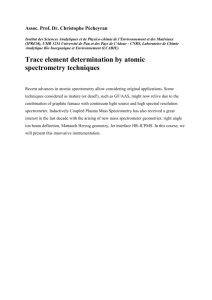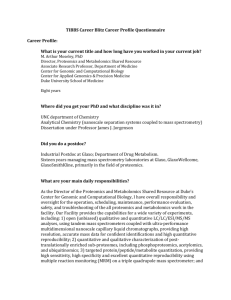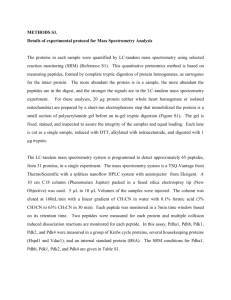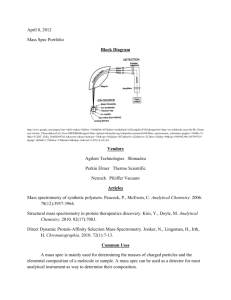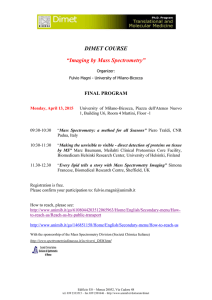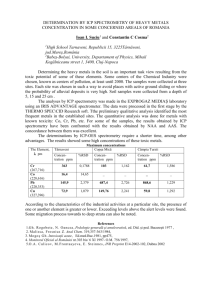Based on its highly successful biennial LC
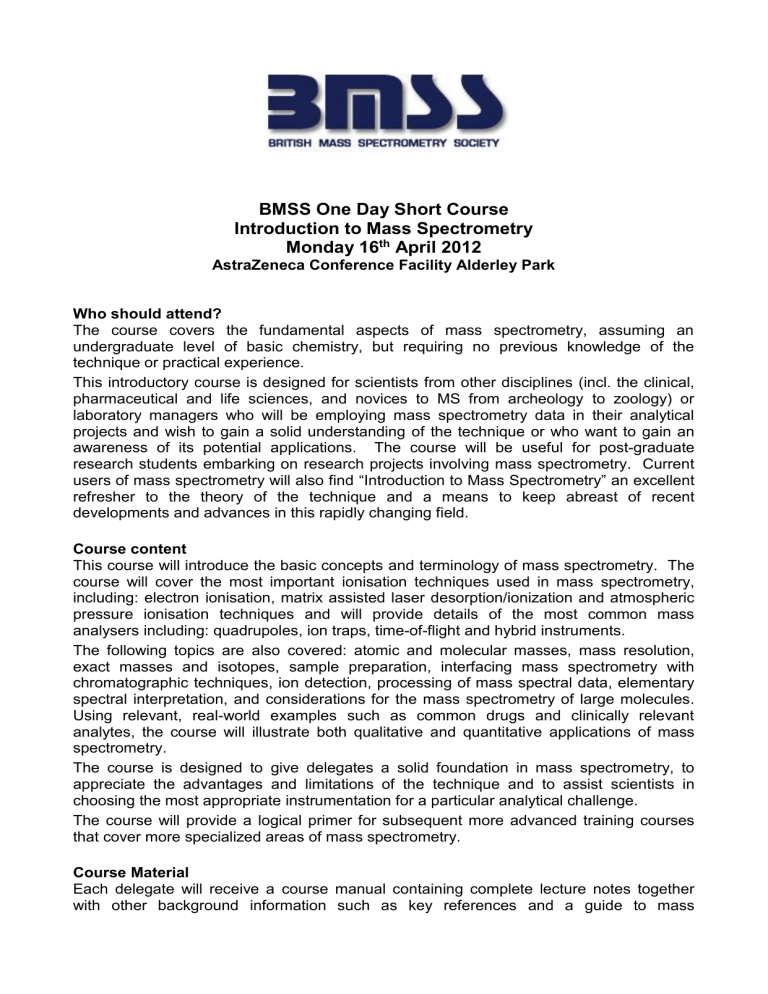
BMSS One Day Short Course
Introduction to Mass Spectrometry
Monday 16
th
April 2012
AstraZeneca Conference Facility Alderley Park
Who should attend?
The course covers the fundamental aspects of mass spectrometry, assuming an undergraduate level of basic chemistry, but requiring no previous knowledge of the technique or practical experience.
This introductory course is designed for scientists from other disciplines (incl. the clinical, pharmaceutical and life sciences, and novices to MS from archeology to zoology) or laboratory managers who will be employing mass spectrometry data in their analytical projects and wish to gain a solid understanding of the technique or who want to gain an awareness of its potential applications. The course will be useful for post-graduate research students embarking on research projects involving mass spectrometry. Current users of mass spectrometry will also find
“Introduction to Mass Spectrometry” an excellent refresher to the theory of the technique and a means to keep abreast of recent developments and advances in this rapidly changing field.
Course content
This course will introduce the basic concepts and terminology of mass spectrometry. The course will cover the most important ionisation techniques used in mass spectrometry, including: electron ionisation, matrix assisted laser desorption/ionization and atmospheric pressure ionisation techniques and will provide details of the most common mass analysers including: quadrupoles, ion traps, time-of-flight and hybrid instruments.
The following topics are also covered: atomic and molecular masses, mass resolution, exact masses and isotopes, sample preparation, interfacing mass spectrometry with chromatographic techniques, ion detection, processing of mass spectral data, elementary spectral interpretation, and considerations for the mass spectrometry of large molecules.
Using relevant, real-world examples such as common drugs and clinically relevant analytes, the course will illustrate both qualitative and quantitative applications of mass spectrometry.
The course is designed to give delegates a solid foundation in mass spectrometry, to appreciate the advantages and limitations of the technique and to assist scientists in choosing the most appropriate instrumentation for a particular analytical challenge.
The course will provide a logical primer for subsequent more advanced training courses that cover more specialized areas of mass spectrometry.
Course Material
Each delegate will receive a course manual containing complete lecture notes together with other background information such as key references and a guide to mass
spectrometry resources. Copies of Best Practice Guides for Generating Mass Spectra and
Accurate Mass Measurement of Small Molecules are also provided.
Delegates will also receive a copy of Anthony Mallet and Steve Down ’s recently published
“Dictionary of Mass Spectrometry”.
CPD
The Royal College of Pathologists and The Institute of Biomedical Science have both approved the course for CPD credits ( 6 and 7 credits respectively) and other Professional
Bodies, such as the Royal Society of Chemistry, will accept the course as contributing to an individual’s CPD Portfolio if it relevant to their employment.
Course Tutors
The course tutors are all members of the BMSS, drawn from industry, instrument manufacturers and academia, who are all experts in their particular fields of mass spectrometry and have considerable experience in the theory and application of the technique. The course provides access to this expertise and an opportunity for networking within a rapidly growing user base.
Registration and Payment
The cost of the course is £375 which includes lunch, refreshments and course manual.
The BMSS offers a discounted rate of
£200 for full time and part time students undertaking research in mass spectrometry when accompanied by confirmation of the academic institution.
Registration is via the BMSS Meeting 2012 Registration form available from the
BMSS2012 Annual Meeting information page
(Note: registration for the meeting is not required for attendance on the course)
Accommodation
Attendees will be responsible for booking their own accommodation, but the names of hotels can be provided by the BMSS Administrator
Further Details
Anna Upton, BMSS Administrator
Tel: +44 (0)1582 793906
E: bmssadmin@btinternet.com
